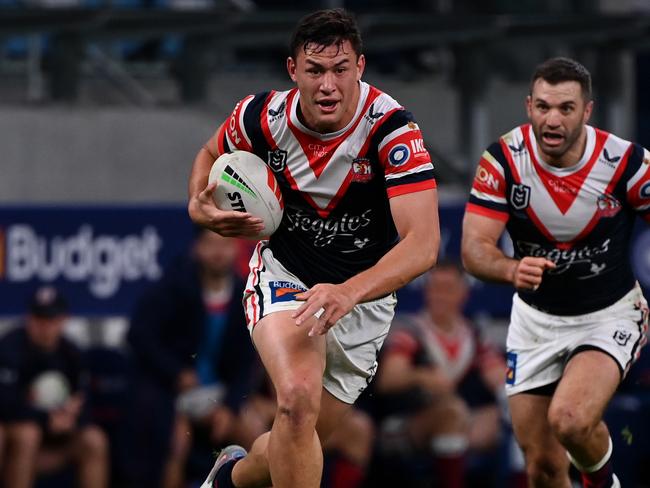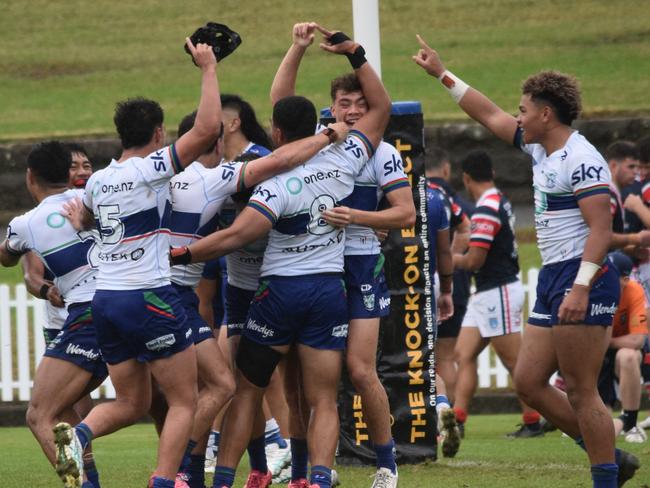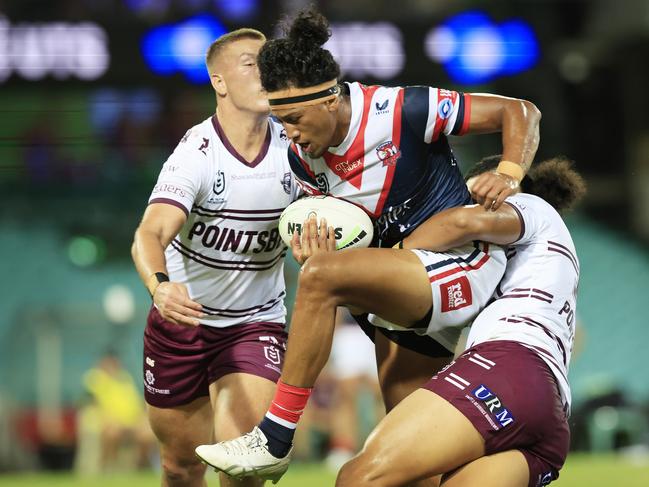NRL 2024: Joey Manu exposes how New Zealand rugby union schools pressure boys to reject rugby league
Joey Manu has lifted the lid on the tactics used by elite rugby union schools to pressure young footballers into walking away from their NRL dreams.

NRL
Don't miss out on the headlines from NRL. Followed categories will be added to My News.
Sydney Roosters superstar Joey Manu has revealed he avoided prestigious union schools in New Zealand out of fear he’d be pressured to walk away from his NRL dream.
It comes as this masthead lifted the lid on those tactics after it was revealed a major sponsor of the rugby union program at Hamilton Boys High School would consider pulling funding over concerns students were being allegedly pressured to walk away from the Warriors pathways system.
Manu, one of New Zealand’s best rugby league products, was born in Hamilton and raised in Tokoroa, where he also went to school before linking with Bondi club in 2014.
Joining a prestigious rugby school was an option but Manu wanted to stay at Tokoroa High School to avoid the country’s code war over rising talent.
Manu said it was not uncommon for some students to hide their preference for league in a bid to avoid risking scholarships and selection in first XV teams.
“It’s been like that for years, mainly private schools. It’s nothing really new, when you go to those big schools. That’s why I stayed in my school so I could play league,” Manu said.
“A lot of kids coming through, they get scholarships to go to big schools, most of them you have to play rugby.
“Some sneak out and play a bit of rugby league on the weekend but that’s been happening for 20 years plus.”

While Manu will leave the Roosters at season’s end to take a deal with Japanese rugby, the Kiwi international believes there is a genuine power shift taking place in his homeland.
The 15-man game is still the main sport in New Zealand but crowd attendances have been trending downwards for years now.
In the first eight rounds of the Super 14 seasons, crowds in New Zealand were down almost 19 per cent on last year over the same period.
The Warriors have enjoyed a resurgence, selling out every home across the ditch so far this season.
Manu credits the Warriors for the renewed interest in rugby league.
“Off the back of the Warriors last year, the crowds this year are a lot more popular than the Super Rugby,” Manu said.
“Usually league is only pretty big in Auckland but I think it’s getting bigger everywhere. It’s good, I’m happy rugby league is getting more popular in New Zealand.”
Junior rugby league participation is also on the rise in the country, and more rugby union schoolboys are choosing to play the sport.
The Warriors already have 26 rugby union schoolboys in its NRL pathways, which this year added a Harold Matthews (under 17’s) outfit for the first time.
The under 17’s side was crowned 2024 champions in its inaugural season after defeating Western Suburbs Magpies in the grand final two weeks ago.

An NRL spokesman told this masthead New Zealand is seen as a ‘growth opportunity’. The NRL is looking to expand its competition to 20 teams, which is likely to include a second team in New Zealand.
Manu’s Roosters teammate Sitili Tupouniua is a product of New Zealand’s famous Mt Albert Grammar School, which is one the top sports schools in the country.
Roosters premiership winner Sonny Bill Williams and Tigers forward Isaiah Papali’i are graduates of the school.
While Tupouniua never experienced any pressure to walk away from league, the backrower said it wasn’t unusual for some students to feel like they had to choose union over league.

“I didn’t experience it myself … I feel like the school was rugby union based and a lot of the boys got scholarships to that school. I feel like when they were trying to play league and the school wasn’t happy because they obviously got them over for rugby union,” Tupouniua said.
Tupouniua played both sports during his schooling days before falling in love with rugby league and moving to Australia as a 17-year old to pursue an NRL career with the Roosters.
“At first I just started playing because the boy I grew up with were playing rugby league and they would just come by my house and tell me to go training with them, I eventually started playing and feel in love with the game.





